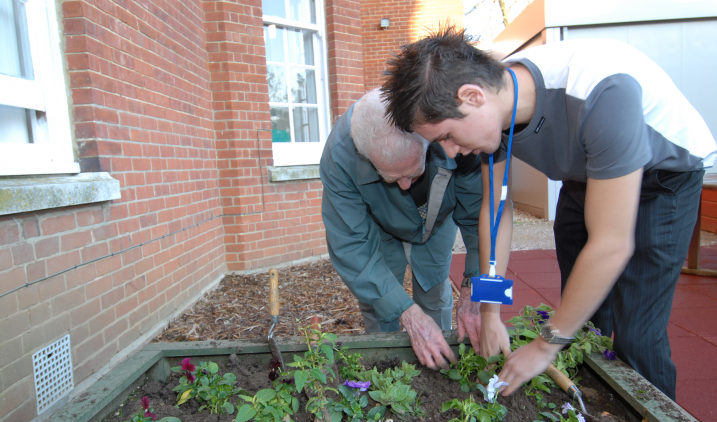Gardeners and grounds staff
Gardeners and grounds staff keep grounds attractive and tidy.
This page has information on the role of gardeners and grounds staff in the NHS, including entry requirements and skills needed.
Working life
Many NHS hospitals and other sites are surrounded by outside areas, making them pleasant places for staff, patients and visitors.

Working as a member of the grounds staff, your work can include
- mowing lawns
- planting and weeding borders
- trimming trees and bushes
- sweeping paths and car parks
- landscaping
- clearing snow and ice
As well as maintenance work, you may be involved in creating new garden areas in the grounds of a hospital, hospice or clinic. This could be to provide
- a peaceful space for patients and visitors
- a quiet place of remembrance
- somewhere for children to play
- relaxation for those with mental health issues or dementia
Who will I work with?
You'll usually be part of the wider estates team which looks after buildings and premises. As a gardener or other member of the grounds staff, you may work alone, particularly in a small building such as a clinic or health centre. Your role may be combined with other duties, for example as a caretaker or estates maintenance. At larger sites, there may be a team of grounds staff, supervised by a team leader.
Gardeners and grounds staff may work at more than one NHS site. If this is the case, you'll usually travel between sites in an NHS vehicle or their own van.
You might be employed as a gardener or do grounds maintenance work employed by a company providing services to the NHS.
Entry requirements
There are no set entry requirements. Employers usually expect a qualification in horticulture or landscaping, such as an NVQ, certificate or diploma. They may also expect some experience of horticulture work. This could be from paid or voluntary work, including during a course or apprenticeship or through experience at home.
Employers may ask for a driving licence.
Although gardeners and grounds staff often join the NHS fully qualified and experienced, it may be possible to train in gardening and grounds maintenance. Employers usually ask for GCSEs (or equivalent) including English and maths.
Skills needed
Gardeners and grounds staff need to be
- interested in gardening and horticulture
- willing to work outside in all weathers
- able to use tools, including power tools
- physically fit for digging, lifting, carrying, etc
- have an eye for design and colour
- able to work flexibly, according to seasons and weather
- working in a team
- communication skills
- practical skills
Training and development
When you start work in gardening or grounds maintenance, you will get the training you need. This will include
- health and safety
- manual handling
- using tools and equipment
- working with plants
You will be encouraged to take further qualifications. Your employer will expect you to keep your skills up to date by going on short courses. These could include topics such as handling pesticides, using tractors or using cutting tools.